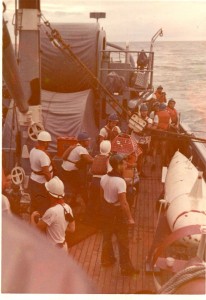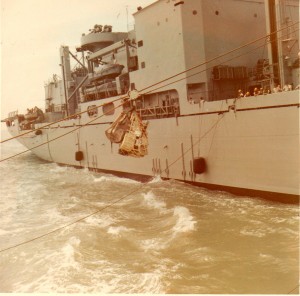Another story from my Navy days…
The hour before dawn usually is a quiet time aboard ship. On this morning all hands are on deck for underway replenishment, the regular delivery of fuel and supplies that sustains our tiny minesweeper on a two-month patrol off the Vietnamese coast. This is our lifeline for fuel, food, ammunition, spare parts and different movies. If we’re lucky there’s mail from home by way of the Philippines and an aircraft carrier in the Gulf of Tonkin.
We’re on course for a scheduled rendezvous with a seagoing gas station and supermarket known as an oiler. On the crowded bridge, we track the oiler on radar and establish voice radio contact. Both ships are darkened under wartime conditions, and we don’t see the other ship until floodlights are turned on when we’re a few hundred yards apart. On the  deck below, men turn up dungaree jacket collars against a light rain and tropic night chill, and put on orange lifejackets and battered hard hats. The deck force is rigging cargo gear while the engine room gang prepares for refueling.
deck below, men turn up dungaree jacket collars against a light rain and tropic night chill, and put on orange lifejackets and battered hard hats. The deck force is rigging cargo gear while the engine room gang prepares for refueling.
It’s called underway replenishment because both ships are moving. Once the oiler is in sight we approach the larger ship from behind to pull alongside. The oiler’s stern looms over us, higher than our bridge, as we batter through the big ship’s wake and along the grey cliff of her side to move into position 50 feet away.
A whistle blows and a shot line, a lightweight rope fired from a rifle, arcs over our ship and is caught. Heavier lines are pulled across, blocks and tackle are rigged and soon the two ships are strapped together with a trolley-like highline and a heavy fuel hose.  Larger ships use winches but small ships like ours do it the old-fashioned way with a line of men digging their heels into the pitching deck to pull cargo nets of supplies and barrels of lube oil over the churning water between the two ships. Occasionally we transfer a man between ships in a specially designed chair.
Larger ships use winches but small ships like ours do it the old-fashioned way with a line of men digging their heels into the pitching deck to pull cargo nets of supplies and barrels of lube oil over the churning water between the two ships. Occasionally we transfer a man between ships in a specially designed chair.
On the bridge the officer of the deck focuses on holding our ship alongside the oiler, matching the larger ship’s course and speed and maintaining a 50-foot distance to keep the lines between the two ships taut. This is precision shiphandling: leaning over the bridge rail to concentrate on a rope with markings that measures the distance between the two hulls, and shouting orders down the voicepipe to the pilothouse below to correct the course one degree, two degrees, and adjust the speed of the engines a revolution or two at a time.
A telephone line has been rigged between the two ships and our captain is talking with the skipper of the oiler. Down on deck, a man signals the other ship with paddles to heave the line or pay it out. Signalmen on each ship exchange wisecracks in semaphore shorthand. Off-duty crewmen on the oiler peer down at us and wave.
Then we hear the music.
Music! High above us on the oiler’s focsle a band is playing, a combo of sailors in dungarees belting out a rock beat through a scratchy loudspeaker. They play in the rain, risking electrocution to entertain the two crews and making up for their lack of talent with raw amplification.
Centuries ago sailors on square-riggers used sea chanteys to add rhythm to the heavy work of raising sails and turning the capstan, and the oiler’s rock band does the same for us. The music breaks the tension on the bridge and brings smiles to the faces of the deck force.
Finally our tanks are full and the last cargo net has been emptied. Orders are passed for the breakaway and dripping ropes are pulled aboard. Once we are unstrapped from the oiler, the officer of the deck gives the order to turn away from the larger ship… and exhales.
The ship settles back into routine as the crew stows equipment and hoses and carries boxes of supplies below. The rain has stopped and the aroma of bacon cooking in the galley mixes with the diesel fumes from the stack. The oiler recedes from view as it continues up the coast to do it all over again, amateur musicians and all, for the next ship up the line. We will do this again ourselves in a few days. And there’s mail.
